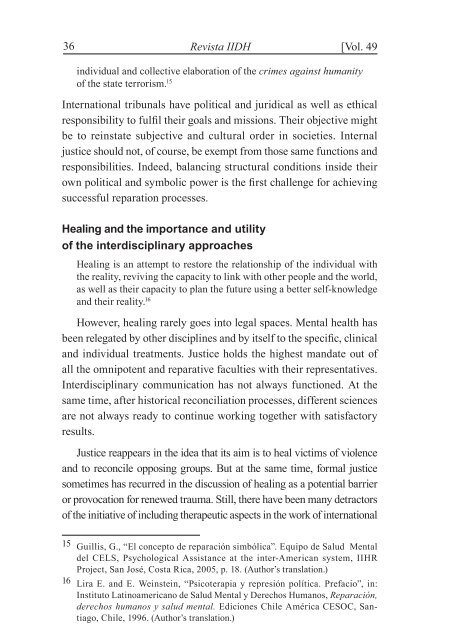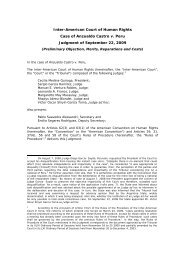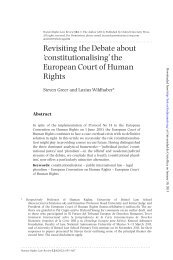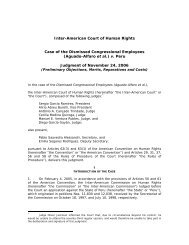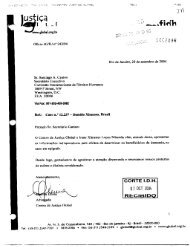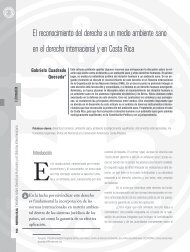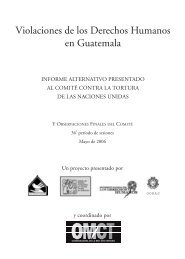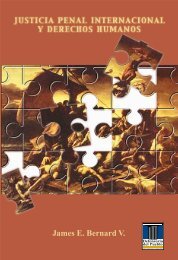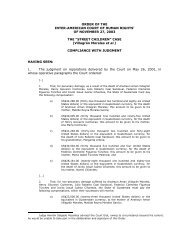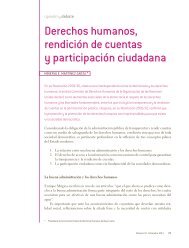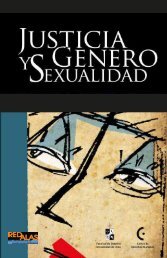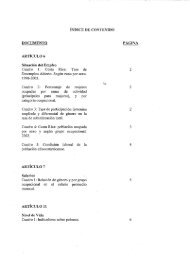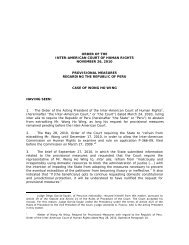Inter-American Court of Human Rights' reparation judgments ...
Inter-American Court of Human Rights' reparation judgments ...
Inter-American Court of Human Rights' reparation judgments ...
- No tags were found...
You also want an ePaper? Increase the reach of your titles
YUMPU automatically turns print PDFs into web optimized ePapers that Google loves.
36 Revista IIDH[Vol. 49individual and collective elaboration <strong>of</strong> the crimes against humanity<strong>of</strong> the state terrorism. 15<strong>Inter</strong>national tribunals have political and juridical as well as ethicalresponsibility to fulfil their goals and missions. Their objective mightbe to reinstate subjective and cultural order in societies. <strong>Inter</strong>naljustice should not, <strong>of</strong> course, be exempt from those same functions andresponsibilities. Indeed, balancing structural conditions inside theirown political and symbolic power is the first challenge for achievingsuccessful <strong>reparation</strong> processes.Healing and the importance and utility<strong>of</strong> the interdisciplinary approachesHealing is an attempt to restore the relationship <strong>of</strong> the individual withthe reality, reviving the capacity to link with other people and the world,as well as their capacity to plan the future using a better self-knowledgeand their reality. 16However, healing rarely goes into legal spaces. Mental health hasbeen relegated by other disciplines and by itself to the specific, clinicaland individual treatments. Justice holds the highest mandate out <strong>of</strong>all the omnipotent and reparative faculties with their representatives.<strong>Inter</strong>disciplinary communication has not always functioned. At thesame time, after historical reconciliation processes, different sciencesare not always ready to continue working together with satisfactoryresults.Justice reappears in the idea that its aim is to heal victims <strong>of</strong> violenceand to reconcile opposing groups. But at the same time, formal justicesometimes has recurred in the discussion <strong>of</strong> healing as a potential barrieror provocation for renewed trauma. Still, there have been many detractors<strong>of</strong> the initiative <strong>of</strong> including therapeutic aspects in the work <strong>of</strong> international15 Guillis, G., “El concepto de reparación simbólica”. Equipo de Salud Mentaldel CELS, Psychological Assistance at the inter-<strong>American</strong> system, IIHRProject, San José, Costa Rica, 2005, p. 18. (Author’s translation.)16 Lira E. and E. Weinstein, “Psicoterapia y represión política. Prefacio”, in:Instituto Latinoamericano de Salud Mental y Derechos <strong>Human</strong>os, Reparación,derechos humanos y salud mental. Ediciones Chile América CESOC, Santiago,Chile, 1996. (Author’s translation.)


